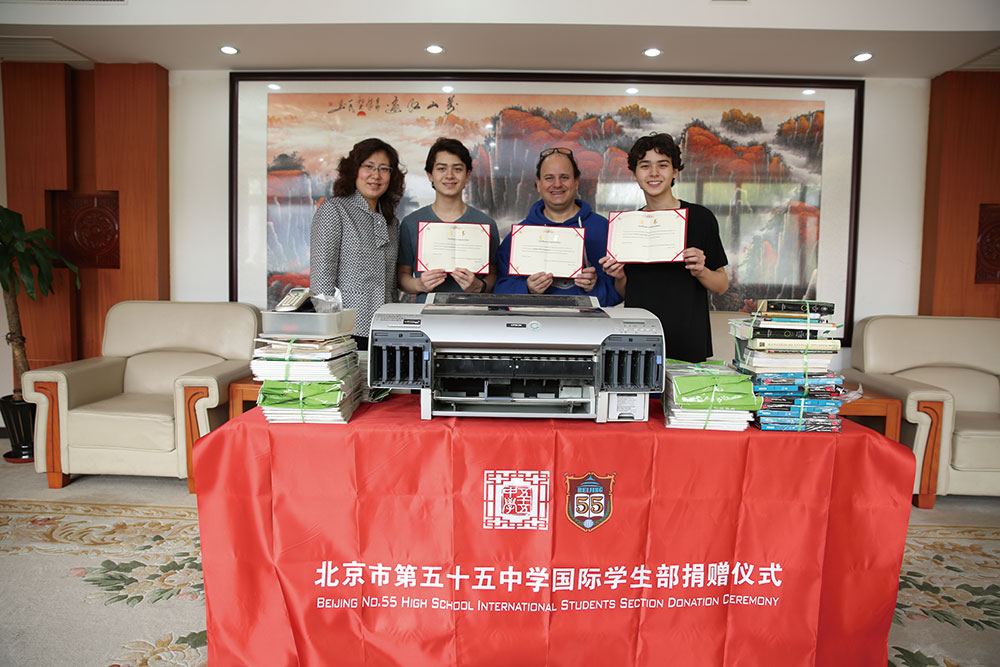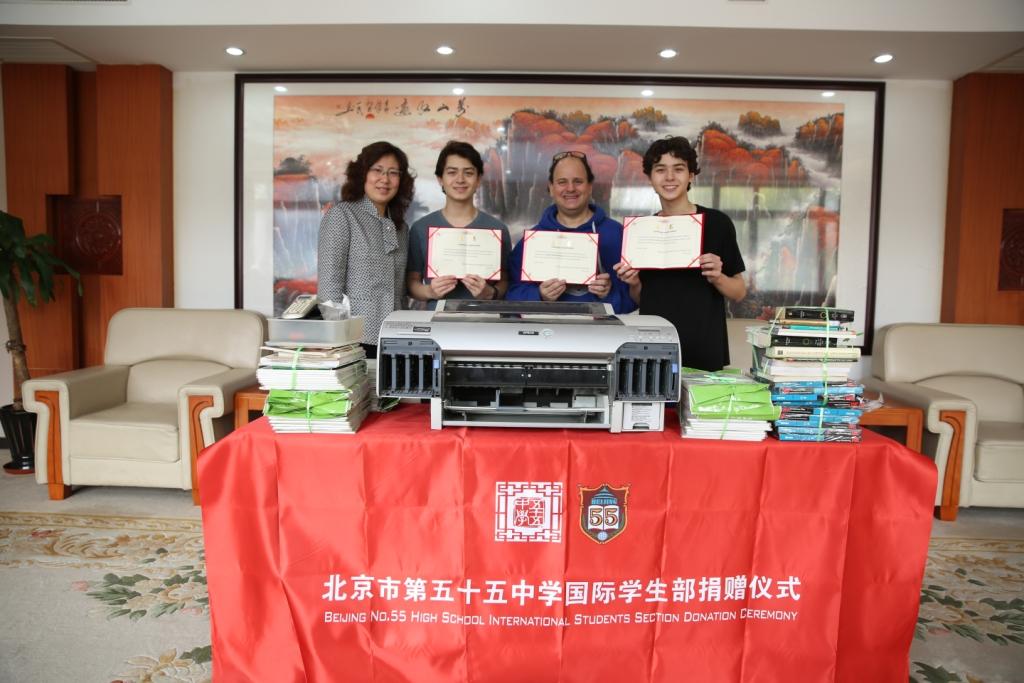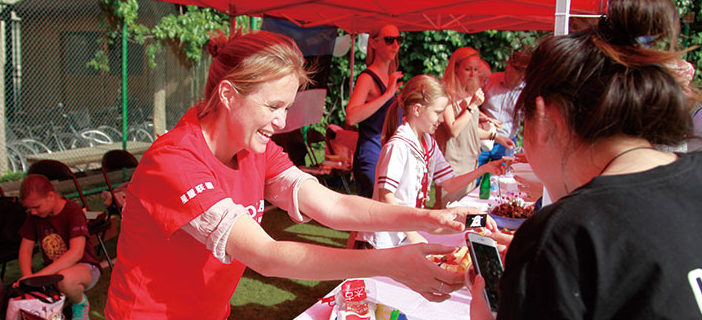We all remember our kids’ first day at school: the excited preparation, the tearful farewells, the terrible wrench of having to hand over our precious offspring to someone else’s care…
As the years go by letting them go gets easier – some days it’s a relief to be rid of them! – but the importance of the relationship between parent and school never diminishes. We all want the best for the kids, but differences in culture or expectations can mean we don’t always see eye to eye on how to achieve it. Parent-Teacher Associations (PTAs), whatever name they go by, can play a valuable role in maintaining good relationships and communication.
The Parent Association at the Canadian International School of Beijing (CISB) has come a long way in the three short years since its founding. We talked to two of its founders, and one more recent member, about how they got involved.
“CISB is a very special school,” the PA Chair, Clara, told us. “We’re located downtown, so it’s a small community, not as big as some others. My kids love this school very much, they’ve been here for almost eight years. I’m very lucky to be a part of this school. But I wanted to know more about the school, and about the IB (International Baccalaureate) program, and get to know other parents.”

“We have a good team here,” agreed Wuwei, who preceded Clara as chair. “But I also wanted to know more about my children’s school life. I wanted to devote my time, and my effort, to make the school even better.”
For Heidi, who recently became middle school representative, it was a change in her circumstances which allowed her to take on the role.
“I own my own company, and from last September the company’s been stable, which meant I have time and could be more involved more with the school. So I asked them if there was any position I could do, and they welcomed me to get involved.”
“We put on activities for parent community,” Clara said, “like flower arrangement classes, cooking classes, or pumpkin carving, which reflect the different seasons. We support school events like Sports Day, and we sit on the Food Committee, to ensure that kids can have healthy and tasty food.”
“We also run the Multi-Cultural Food Festival,” Wuwei told us. “Since the school has families from 60 countries, we call on all parents, and each year more than 100 parents provide food from their country. The guests taste the food, we have performances from different countries, from both children and teachers, and fun games.”
Over 1,000 guests attend the Food Festival, but it’s no longer their biggest event, organizationally speaking.
“On March 31,” Clara told us, “we held our first Charity Ball, with more than 300 participants. The theme was Joy in Caring, and our purpose was to support children in difficulties in Yunnan. Each child will have one pair of rain boots to help them go through muddy roads to school.”
The success of the ball, raising over RMB 300,000, has given them a problem, albeit a pleasant one.
“The money raised is much more than expected, so we’re going to donate all the money to the foundation, and we’re discussing how to use the money to help the children.”
All these activities require a great deal of coordination.

“We have a lot of meetings!” Wuwei said. “According to the constitution, we have formal meetings four times a year with school administration. And we communicate among ourselves online and offline.”
“Organizing the charity ball for example,” Clara said, “every one of us will have a division of work based on what we are good at. Heidi is the director of the ball, in this case, she will have the final say.”
“There’s a discussion almost every night on WeChat after the kids go to bed,” Wuwei says, and Heidi adds, “It’s not easy to be in the Parent Association!”
But there are compensations, she told us.
“I learned a lot. I’m in my first year in the Parents’ Association, it’s exciting, there’s a lot of things to learn. I’ve learned about how the school organizes things, how to communicate with the school. My education was a traditional Chinese one, and sometimes I get into conflict with my daughter, but after these six months I know why my daughter is thinking this way, I know how to communicate with her, not to push too much, and she will know how to communicate with teachers.”
Clara had a similar story to tell.
“I get a chance to know more about the philosophy of the school,” she said. “How they organize their teaching, what their beliefs are, and how they transfer them into the daily learning of the students. I have four kids, two are in this school, and my daughter is at a public school. When I got into the Parent Association I learned more about international schools.
“Also as a member of the PA, we should set a good example for kids, if we want them to volunteer and to be more active.”
“Action is much more important,” Wuwei said. “Thinking is good, but action is more important!”
The Parent Association at CISB was set up by the school, but the Parents’ Committee at the international section of No. 55 High School evolved through necessity. Joseph Rubenstein, committee chair, described the situation when his older son started at the school, six years ago.
“It seemed less organized than it is now,” he told us. “It used to be very loose. The Korean parents were a cluster, the Indian parents were a cluster, the western parents weren’t organized, and there were crises. The school ganging up on parents, parents ganging up on the school… there was a ‘stay away from our turf’ mentality.”
Rubenstein was invited to resolve some issues because he had successfully carried out a similar role at his sons’ previous school.
“I was this big nose loudmouth foreigner,” he said. “The parents like to use me as the bullet for their gun. You have to not let them do things in your name. You have to have the courage to stand up to both schools and parents, to get past the emotion, get past the nonsense.”
He defused the situation, and a series of meetings began.
“The first one or two were kind of dumb,” Rubenstein recalls, “then they started having a meaningful discussion. The catalyst was fees jumping for one grade and not others. It was all minor grievances at first, then that was the thing that galvanized people and got big parent involvement.”
This led to the establishment of a formal parent committee, though the structure is less formal than in other schools.
“We take notes,” Rubenstein said, “but we don’t read the minutes of the last meeting, we don’t follow Robert’s Rules of Order. There is a board, and it has been constituted. It has a couple of meetings a year, and my wife and I share a seat. A lot of the time we have her engage with the Chinese parents, and I’m used as fixer guy in the middle. There are things that are important which I will engage in, but the school has done an excellent job.”
Rubenstein takes a practical view of problem-solving.
“You have to understand the realities of China,” he said. “Sometimes the school can’t do exactly what you want, but the end result can be the same. Sometimes you have to trust in the system.
“There’s a Chinese saying: don’t push the river. You have to run ahead of the river and reconstruct what you want to happen, so when the flow gets there it flows the way you want. Those that jump up and down screaming just end up tired. Little gestures go a long way.”
The parents, as well as the school, need to be approached with patience.
“The Korean bloc stuck to themselves,” Rubenstein said. “It took going to a couple of parents and saying ‘what are your issues?’ At first, they said ‘everything’s fine,’ then it was ‘issue issue issue…’ Now there are parent reps for that group that engage, and that’s really helpful. It breaks down barriers with the kids as well. Things are flowing very smoothly now.”

Like the parents of CISB, Rubenstein has found technology to be an aid to communication.
“WeChat has been a huge help. It connects people, you can figure out what’s going on, have sidebar conversations and jump back in it.”
But the most important aspect, he said, is remaining impartial.
“I’ve been accused by the school of taking the foreign side, and accused by parents of being too ‘Chinese’. There are times when people have legitimate concerns, and times when people need to take a deep breath and shift their attention to realities, not emotions. Education is by far one of the most important aspects of life for people, and you need to respect that.”
He has found the leadership of No. 55 have engaged positively in this process.
“They all listen,” he said, “they’re open to suggestions, they have their own ideas which they’re willing to share, and they’re open to compromise. We have more activities, which are more meaningful, and impact at right time. They’re becoming more open rather than more closed.”
“It’s not perfect,” Rubenstein said. “There are cultural differences, but if people act from the heart, and listen, and respect each other, we get a lot done.”

Photos: Courtesy of CISB, Beijing No. 55 High School
This article appeared on p57 of beijingkids May 2018 issue




